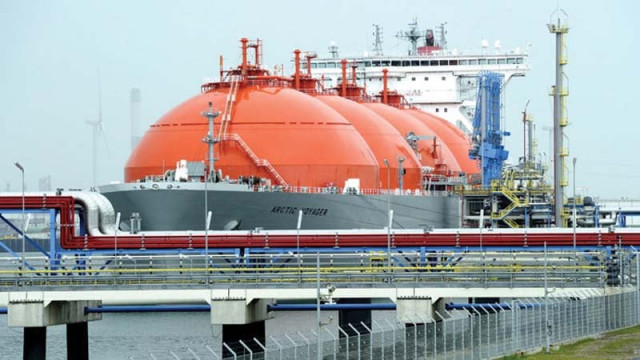Centre decides on higher rates of LNG, ignores OGRA
Charging different prices for textile, CNG and IPPs

Ogra had determined a provisional price of $8.6 per million British thermal units (mmbtu). However, the government has allowed Sui Northern Gas Pipelines Limited (SNGPL) to charge up to $12 per mmbtu. PHOTO: FILE
The federal government seems to have ignored the LNG price set by the Oil and Gas Regulatory Authority (Ogra), and instead decided on higher rates for different kinds of consumers.
The development has caused some controversy among followers who blame the centre for bypassing the regulator and taking the decision unilaterally.
Pakistan close to clinching $16b Qatar LNG deal
After conducting public hearings and taking input from stakeholders, Ogra had determined a provisional price of $8.6 per million British thermal units (mmbtu). However, the government has allowed Sui Northern Gas Pipelines Limited (SNGPL) to charge up to $12 per mmbtu.
Among other sectors, the federal government decided higher prices for CNG stations, meaning that it would be difficult for them to maintain the 30% price parity with petrol directed by the Economic Coordination Committee (ECC).
Officials familiar with the development said that the gas utility was charging a higher price at a time when LNG prices had witnessed a decline in global market. In addition, the gas utility was charging three prices for each category of consumers.
“The gas utility is charging $8.6 per mmbtu from Independent Power Producers (IPPs) and the fertiliser sector, $10.5 per mmbtu from the textile industry and $12 per mmbtu from CNG consumers,” officials said, adding that the regulator had determined the price of LNG following rules and regulations set in the Ogra ordinance. However, the federal government is setting prices under the Petroleum Development Levy (PDL) Ordinance by treating importing gas as a petroleum product.
By doing so, the centre has virtually ended the role of the regulator. The development comes after the federal government had pressured Ogra to set LNG rates without conducting public hearings, a directive the regulator refused to comply with.
In setting the provisional price of LNG, Ogra refused to approve 4% margin for Pakistan State Oil (PSO), which was then set at 1.8%. This seemingly upset the federal government, which then found a new way by approving higher rates under the Petroleum Ordinance.
Earlier, the federal government had decided that those consumers would be allotted LNG who were within the transmission network of gas utilities. However, later it allowed textile units to get LNG which lie in the distribution network. The government had also approved a policy for the use of LNG in CNG stations in Punjab that had been shut down for the last two years. Under the policy, the CNG sector was allowed some incentives to keep LNG price at 30% parity of petrol.
However, the CNG sector in Punjab has not received LNG for the last four months and imported gas is being extended to other sectors including textile.
Meanwhile, the officials said that Pakistan had received only one shipment of LNG during this month, which was below the requirement.
However, the gas utility has resumed supply on account of LNG. This has led some to raise the question of whether the gas supply was being resumed to LNG consumers at the higher rate.
Pakistan, Qatar sign $16 billion LNG deal
Officials said that Ogra is pursuing action and wrote a letter to the petroleum ministry seeking an explanation as to why the gas utility was charging different LNG prices for different consumers. The regulator was yet to receive a response from the ministry.
Published in The Express Tribune, February 16th, 2016.
Like Business on Facebook, follow @TribuneBiz on Twitter to stay informed and join in the conversation.



















COMMENTS
Comments are moderated and generally will be posted if they are on-topic and not abusive.
For more information, please see our Comments FAQ